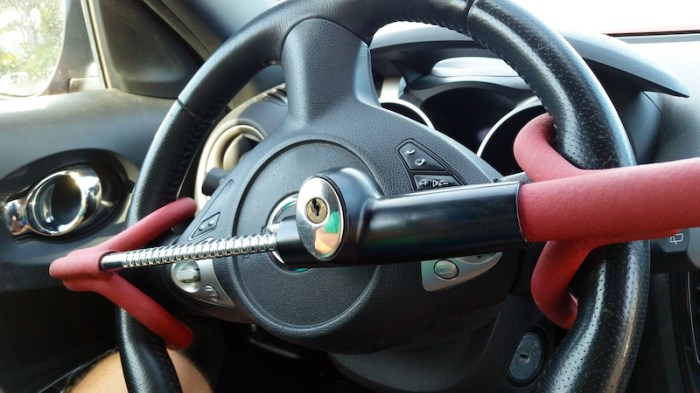Anti-theft devices will raise your insurance premiums. This statement raises important questions about the cost-benefit analysis of installing such devices. In this article, we will explore the various types of anti-theft devices available, their impact on insurance premiums, and alternative methods of deterring theft.
Anti-theft devices are designed to protect vehicles from unauthorized access and theft. They come in a variety of forms, each with its own advantages and disadvantages.
Anti-Theft Devices and Insurance Premiums

Anti-theft devices are designed to deter or prevent vehicle theft. While they can provide peace of mind and potentially reduce the risk of theft, they can also impact insurance premiums.
Types of Anti-Theft Devices
There are several types of anti-theft devices available, each with its own benefits and drawbacks:
- Alarms: Sound an alarm when unauthorized entry is detected.
- Immobilizers: Prevent the engine from starting without the correct key or device.
- Tracking systems: Use GPS or other technology to locate a stolen vehicle.
Insurance Premiums
Insurance companies consider anti-theft devices when setting premiums for vehicles. While some devices may reduce the risk of theft, they can also increase the cost of the vehicle, which can lead to higher premiums.
Data from the National Insurance Crime Bureau shows that vehicles with anti-theft devices have a lower theft rate than those without. However, this does not necessarily mean that anti-theft devices will always result in lower insurance premiums.
Cost-Benefit Analysis
When considering whether or not to install an anti-theft device, it is important to conduct a cost-benefit analysis.
| Type of Device | Average Cost | Potential Insurance Premium Savings |
|---|---|---|
| Alarm | $100-$500 | $10-$50 per year |
| Immobilizer | $200-$1,000 | $20-$100 per year |
| Tracking system | $300-$2,000 | $30-$200 per year |
Alternatives to Anti-Theft Devices, Anti-theft devices will raise your insurance premiums.
In addition to anti-theft devices, there are other methods of deterring theft, such as:
- Parking in well-lit areas
- Using a steering wheel lock
- Hiding valuables from view
General Inquiries: Anti-theft Devices Will Raise Your Insurance Premiums.
Do all anti-theft devices raise insurance premiums?
No, not all anti-theft devices will raise insurance premiums. Some insurance companies offer discounts for vehicles equipped with certain types of anti-theft devices, such as alarms or immobilizers.
What factors do insurance companies consider when setting premiums for vehicles with anti-theft devices?
Insurance companies consider a variety of factors when setting premiums for vehicles with anti-theft devices, including the type of device, the value of the vehicle, and the driver’s claims history.
Are there any alternatives to anti-theft devices?
Yes, there are a number of alternatives to anti-theft devices, such as parking in well-lit areas, using a steering wheel lock, or installing a tracking system.


